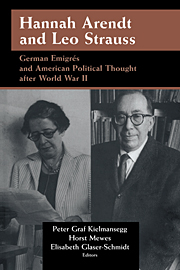Book contents
- Frontmatter
- Introduction
- PART I HANNAH ARENDT
- 1 Hannah Arendt and the Theory of Democracy: A Critical Reconstruction
- 2 The Questionable Influence of Arendt (and Strauss)
- 3 Hannah Arendt: A German-American Jewess Views the United States - and Looks Back to Germany
- PART II LEO STRAUSS
- PART III ROUNDTABLE DISCUSSION
- Select Bibliography of Works by Arendt and by Strauss on Modern Political Science and Philosophy
- Index
3 - Hannah Arendt: A German-American Jewess Views the United States - and Looks Back to Germany
Published online by Cambridge University Press: 05 January 2013
- Frontmatter
- Introduction
- PART I HANNAH ARENDT
- 1 Hannah Arendt and the Theory of Democracy: A Critical Reconstruction
- 2 The Questionable Influence of Arendt (and Strauss)
- 3 Hannah Arendt: A German-American Jewess Views the United States - and Looks Back to Germany
- PART II LEO STRAUSS
- PART III ROUNDTABLE DISCUSSION
- Select Bibliography of Works by Arendt and by Strauss on Modern Political Science and Philosophy
- Index
Summary
Hannah Arendt came to the United States as a refugee from the racial persecution and racial genocide being practiced by the totalitarian regime in Germany and eventually became an American citizen. This experience continued to influence her view of the U.S. political system. And although, toward the end of her life, she leveled harsh criticism against specific political practices, Arendt never altered her fundamental agreement with the principles of the American Constitution and the political perceptions upon which these were based. Her entire political thought can be understood as an attempt to contrast and even reconcile the basic principles of the American political system with European, above all German, traditions. In this attempt, she was guided by the principles of classic American political thought that she discerned in the ideas of the Founding Fathers.
In a letter to Karl Jaspers, dated January 29, 1946, one of the very first letters of their renewed correspondence following the Second World War, Hannah Arendt tried to explain her view of the United States to her former teacher.
With good reason you say "Happy America" — for here, in virtue of the essential soundness of the political structure, the so-called society has not yet become so overwhelmingly strong that not many exceptions are tolerated.
Much could be said about America. Here there really exists something like freedom and a strong feeling in many people that without liberty one cannot live. The republic is no void chimera, and the fact that there exists no national state and no really national tradition - although there is an enormous need for coteries in the different national minorities and the "melting-pot" for the most part is not even an ideal, let alone a reality - has created an atmosphere of freedom or at least of non-fanaticism. What is more is that here people feel responsible for public life to such an extent as I do not know of from as many European countries. . . .
- Type
- Chapter
- Information
- Hannah Arendt and Leo StraussGerman Émigrés and American Political Thought after World War II, pp. 45 - 58Publisher: Cambridge University PressPrint publication year: 1995
- 2
- Cited by



